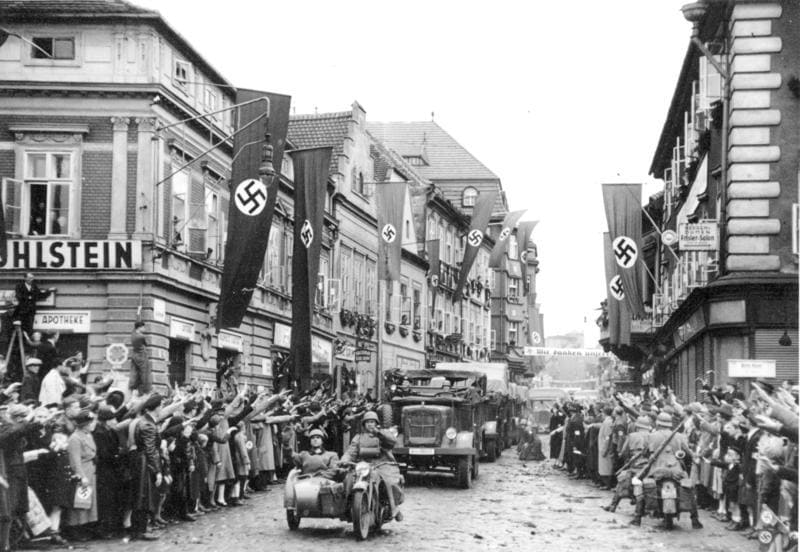
In the sixth episode of the seventh season of Seinfeld, most of America was introduced to the term “Soup Nazi.” And even if you weren’t a fan or didn’t watch the episode, you’ve probably heard about it since then. Although it was based on a real person (Al Yeganeh, who once owned “The Original Soupman” in New York City), the use of the term Nazi was used the way it so casually is, “as an exaggeration of the excessively strict regimentation he constantly demands of his patrons.” And it’s true. His rules were very clear when in operation: “Pick the soup you want! Have your money ready! Move to the extreme left after ordering!” I laughed. I imitated. I adopted the term.
One of my very first posts was about my experience with my hairdresser at the time who I affectionately called “The Hair Nazi.” He, too, had very strict rules about what he would and wouldn’t do to your hair. He made it seem like he chose you as a client as opposed to the other way around. To hear me tell the story, it’s actually quite funny. And I don’t plan to stop telling the story but I plan to stop using the term Nazi. There’s no room for that term to ever be used casually.
Recently, I plowed through several books that all focused on some aspect World War II. It was unintentional that my choices had a similar subject matter but all gave me great food for thought. There was Sarah’s Key from Tatiana de Rosnay set in Paris, July 1942.
Sarah, a ten year-old girl, is brutally arrested with her family by the French police in the Vel’ d’Hiv’ roundup, but not before she locks her younger brother in a cupboard in the family’s apartment, thinking that she will be back within a few hours.
A few months later, I stumbled into the audiobook version of The Book Thief by Markus Zusak and it quickly made its way to my list of the best books I’ve ever read.
It’s just a small story really, about among other things: a girl, some words, an accordionist, some fanatical Germans, a Jewish fist-fighter, and quite a lot of thievery. . . .
More recently, I listened to the popular All the Light We Cannot See by Anthony Doerr. A challenging but memorable read.
This is a beautiful, stunningly ambitious instant New York Times bestseller about a blind French girl and a German boy whose paths collide in occupied France as both try to survive the devastation of World War II.
But it was once I finished The Nightingale by Kristen Hannah that I really understood World War II in a new light, a new context.
Kristin Hannah takes her talented pen to the epic panorama of WWII and illuminates an intimate part of history seldom seen: the women’s war. The Nightingale tells the stories of two sisters, separated by years and experience, by ideals, passion and circumstance, each embarking on her own dangerous path toward survival, love, and freedom in German-occupied, war-torn France.
All of the above stories are fictional, most likely falling in the genre of historical fiction. So why does it take a story to better help me understand our past? For me, it’s finding the story that speaks to you and more importantly stays with you.
Long after I finished the story of Isabelle and Vianne in The Nightingale, I couldn’t get it out of my head. It’s the story of two sisters who followed very different paths during the time when France was occupied by Germany. One tolerated the Nazis in order to protect her friends and children while living in a sort of unshackled imprisonment. The other, young and impetuous, was determined to make a difference using her femininity as as advantage instead of an impediment.
The story and characters were so real and their suffering so palpable that I found myself wondering how much of the novel was true. It turns out that Kristen Hannah did a tremendous amount of research reading women’s memoirs and using them to create a story that wasn’t necessarily true but easily could have been. More than it being an engaging story, it helped me to see the Nazis in many ways – arrogant, cruel, human, ruthless, brutal. And it helped me to better understand their mission and the repercussions not just for the Jews in Europe but for anyone who dared oppose them. There was no real happy ending to the story, perhaps as it should be.
We need reminders of this time in human history. We need reminders that things that sound or seem impossible can become a brutal reality in the wrong hands. We need to never ever minimize what the Nazi party stood for and the effect they had on millions of lives.
Recently, I read a story in the news about a 95 year old man being brought to trial for his role as a medic at Auschwitz. Although he is suffering from dementia, he will stand trial for his role in the deaths of 3,681 people, the number approximated to have been killed at Auschwitz during one month of his service there.
When reading articles like this, it’s often the comments that are the most enlightening. There’s a gross lack of understanding and context, in generations that haven’t been touched by World War II. Luckily, we still have other commenters around to help broaden the perspective.
I wish it hadn’t taken me so many years to see the word “Nazi” for what it is. It’s not a funny term for someone who adheres to strict rules. It’s a name for a dark time in our history and reminder that not all humans are inherently good.
Disclosure: there may be some affiliate links in this post.
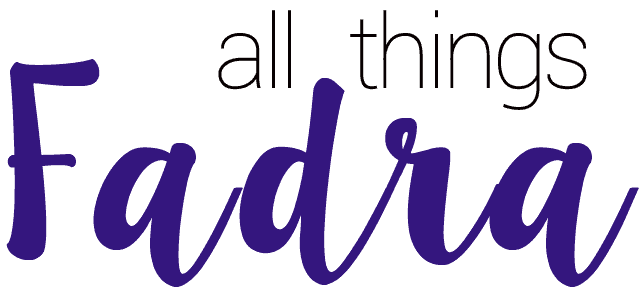
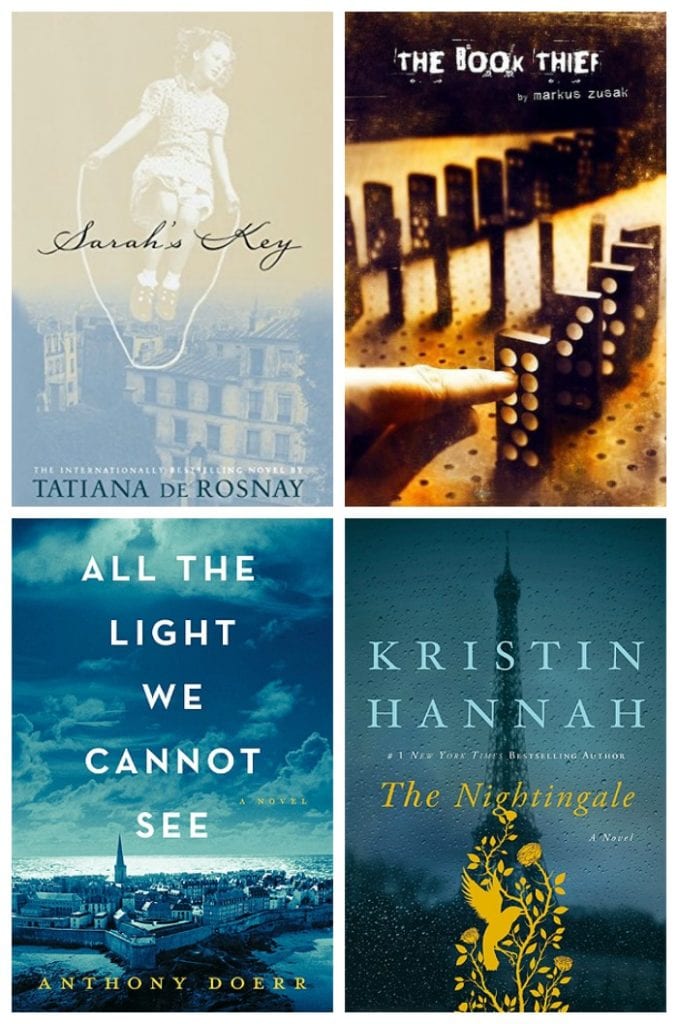
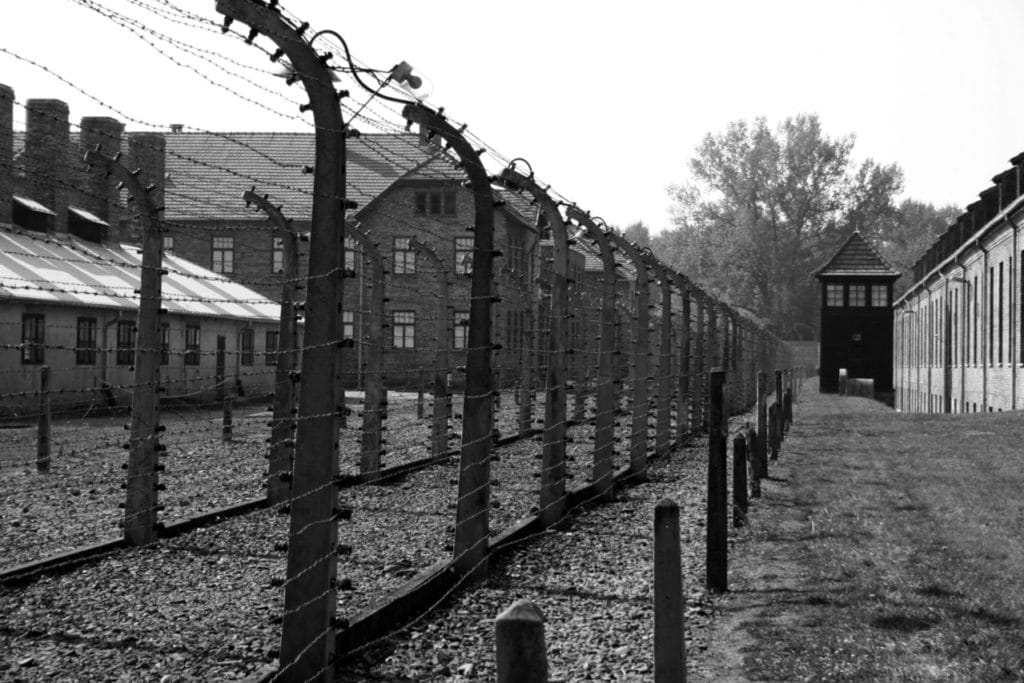
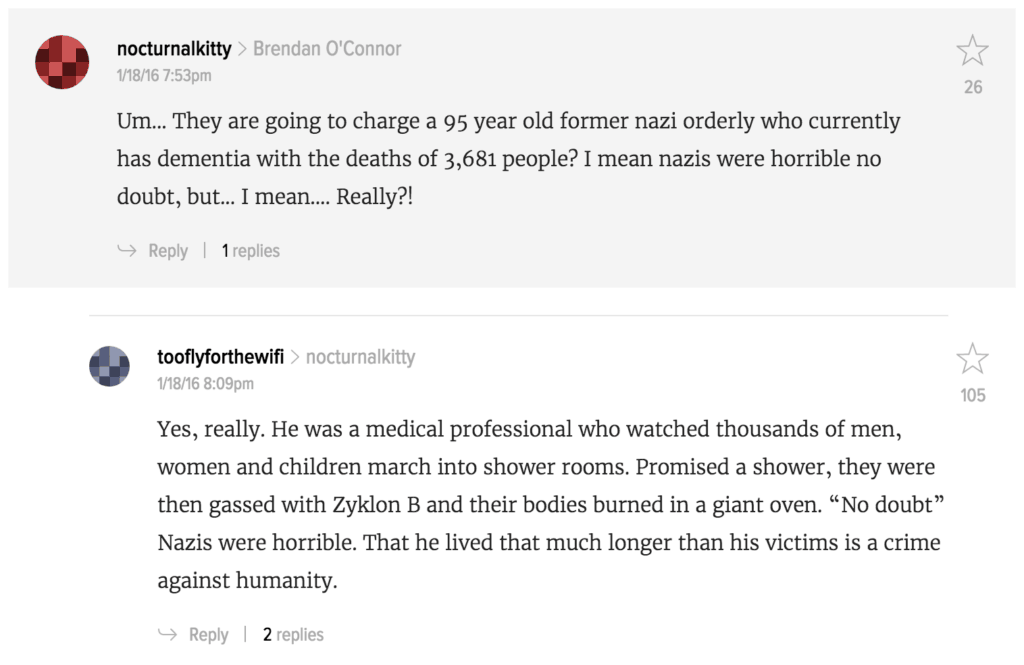
26 comments
I am like you-I never really gave the term another thought. Thanks for pointing this out and using the books as illustrations. And I love love loved The Book Thief. Probably one of my faves of all time (along with To Kill a Mockingbird). I like you are mixing it up with your posts 🙂
I’ve never read To Kill a Mockingbird. I know it’s a classic but I never knew if it was worth reading. You’ve convinced me that now I should. And I’m trying to write more and spout less 😉
Love this post! Very well-written and thought-provoking. I watched the movie version of Sarah’s Key before I realized it was based on a book. My daughter has The Book Thief – I need to read that one too!
I haven’t watched Sarah’s Key. I almost wonder if the movie would be too upsetting. But The Book Thief is a must read (or listen – I loved the audiobook). In fact. I was surprised when I found out it was considered Young Adult. Worth a read for anyone.
As a jew, I do cringe when I hear someone use the term Nazi in any context. Thanks for writing this. Very well written and I hope it will educate people who use the term casually.
I’ve never heard anyone give the lesson that we shouldn’t use the term casually but it could be because it’s not something that’s ever come up in my circles. Or maybe I just wasn’t listening hard enough.
Thanks for this, Fadra. From many people like me who have hated the word for quite some time, seeing someone explain their process towards stopping the use of it matters. And it matters that people see what you’re saying and recognize the importance of it. So, thank you.
Thank you for sharing your perspective with me as well. Proof that as we age, we still have a lot to learn.
Sarah’s Key was so good … the movie made me cry (have you seen it?), especially when she goes back to the apt. to search for her sibling. SO SAD.
Sarah’s Key was so good … the movie made me cry (have you seen it?), especially when she goes back to the apt. to search for her sibling. SO SAD.
I haven’t seen the movie because I’m SURE it would make me cry. And movies usually aren’t as good as the books. But you’re the second person to mention it so I think I will.
The book was different, I read that as well as saw the movie. Movie changed up a few things but that one scene was the one I always remember. Very sad.
An important reminder that words matter and have meaning and that we need to think about and choose them carefully, not flippantly. Have you come up with a new term for the hairstylist?
Luckily, I don’t go to that hair stylist anymore so I can just refer to him as a jerk. Or stalwart. Or I’ll just make up a term.
An important reminder that words matter and have meaning and that we need to think about and choose them carefully, not flippantly. Have you come up with a new term for the hairstylist?
Hmmm – you just hit me real hard right here. I never gave this term a THOUGHT and will forever change my ways.
Right? I never really did either even those, since this post, I’ve had several Jewish friends share their thoughts on this. It just never occurred to me. I guess we all still have a lot to learn.
Thank you for pointing this out and sharing these books. Once I read Sarah’s Key, I never thought of Paris the same.
That’s how I felt about Sarah’s Key too. I guess I always think of Germany when it comes to the Nazis and the Holocaust but it affected so many nations, especially France. The Nightingale also gave me more of the French perspective.
I read comments like the one you shared in your post and my heart sinks. As the years pass, people forget the scope of the horror committed against millions of human beings, particularly if they have no personal connection. The survivors of the Holocaust are elderly; who will speak for them when there are all gone? The fact that “Nazi” has become a term to be used casually scares me. I’m glad you’re no longer using it, and I hope others do the same.
I read comments like the one you shared in your post and my heart sinks. As the years pass, people forget the scope of the horror committed against millions of human beings, particularly if they have no personal connection. The survivors of the Holocaust are elderly; who will speak for them when there are all gone? The fact that “Nazi” has become a term to be used casually scares me. I’m glad you’re no longer using it, and I hope others do the same.
Another comment in that same post said that they could take anyone seriously who used the phrase, “I know the Nazis were terrible, BUT…” There really is no but.
This is such a great read and put a lot into perspective
This is such a great read and put a lot into perspective
Have you watched “The Man in the High Castle”? I find the alternative ending to the war, and the society portrayed equally thought provoking to the above novels.
No, but my sister keeps pushing me to watch it. I just need to find time when younger eyes and ears aren’t around.